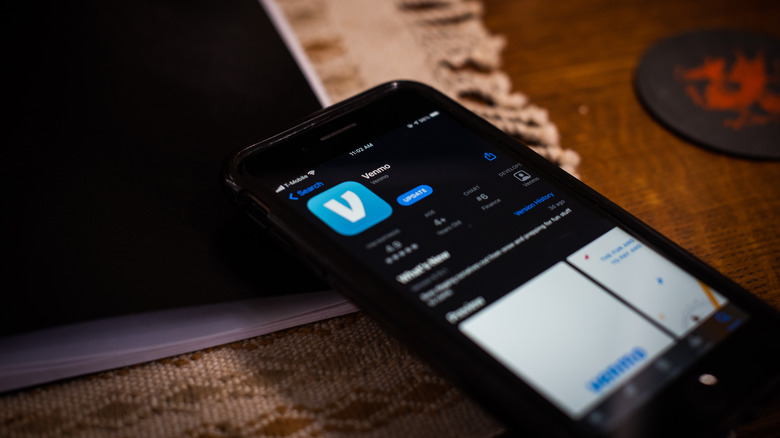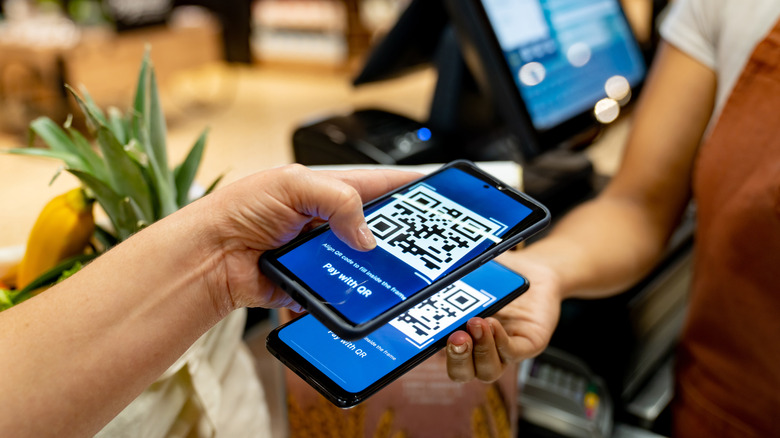The Dark Sides Of Venmo You'll Wish You Knew About Sooner
From easily paying a friend back to buying things from local shops and farmers' markets, there is (almost) no limit to what social payment apps can help you pay for. Like carrying a digital wallet around with you, these apps can make sure you never have to worry about getting cash ever again. In fact, approximately 85% of consumers (aged 18 to 29) have reported using a peer-to-peer payment app, and the total transaction volume across all of them in 2022 was around $893 billion. While these apps have certainly become all the rage, especially among younger consumers, perhaps none are more popular than Venmo. Venmo is the clear stand-out among peer-to-peer payment apps and, as of 2022, the app boasted almost 90 million accounts in the U.S.
The influx of digital wallet apps like Venmo has even changed the way Americans shop. In fact, in one study, 46% of digital wallet users were more likely to abandon a purchase if they couldn't use a digital wallet during the check-out process. This has pushed more and more companies and subscription services to begin taking Venmo as a payment option, making the app even more usable than ever. However, while there is certainly a lot of freedom in using Venmo, there are also some downsides you might not be aware of. From fraud to a lack of financial protections, let's dive into the cons of relying too heavily on Venmo for your purchases.
The cons of Venmo
In case you don't already know this, you have to have a U.S. phone number and be physically located in the U.S. in order to actually use Venmo. This can be extremely limiting for anyone who travels regularly, works and/or lives in a border city, or for U.S. military personnel who might be stationed overseas. Another big factor to consider has to do with storing money in your Venmo account. Unlike traditional checking or savings accounts which can have varying annual percentage yield (APY) rates, Venmo accounts do not accrue any interest while your money is parked there. Similarly, since Venmo accounts are not bank accounts, they are not Federal Deposit Insurance Corporation (FDIC) insured. This means that if Venmo folds as a company, they would not be obligated to return your account balance to you.
Venmo also imposes limitations on its transfers to and from bank accounts. For instance, customers (who've completed an identity confirmation process) are able to transfer up to $19,999.99 per week to their bank account. However, the per-transfer limit is only $5,000, meaning you'd need to make multiple transfers to reach that maximum amount. Venmo also states that these transfers can take anywhere from one to three business days for standard transfers. With that in mind, Venmo does offer an Instant Bank Transfer option which can allow your funds to be available from qualified banks within 30 minutes, but it incurs a 1.75% fee on the transfer amount.
Other factors to keep in mind
New tax laws have also impacted Venmo users. While some states have already lowered the threshold amount for reporting (Maryland, Massachusetts, Vermont, and Virginia), tax year 2023 will be the first year the IRS implements a country-wide $600 reporting threshold for all goods and services Venmo payment transactions. While this has no impact on friends or family transfers, it could end up costing small business owners and makers come tax season. The previous transaction reporting limit (in most states) was $20,000 and over 200 transactions.
The Consumer Financial Protection Bureau (CFPB) has also been notably vocal about the dangers of using digital payment apps. In June 2023, they found and subsequently issued an advisory to consumers about the lack of financial protections for money left in digital wallet accounts. Money left in these accounts is not only not protected for consumers but is also oftentimes being used by app companies to invest and earn a profit from. The CFPB has also put Venmo on notice regarding their susceptibility to fraud and scams. In 2021, the CFPB stated they would put the security measures of digital payment apps under greater scrutiny in the hopes of helping consumers avoid payment fraud, and in June 2023, the U.S. Senate's Committee on Banking, Housing, and Urban Affairs even wrote an open letter to the CEO of Paypal (which owns Venmo) inquiring as to the widespread fraud and scams affecting consumers on the app.


